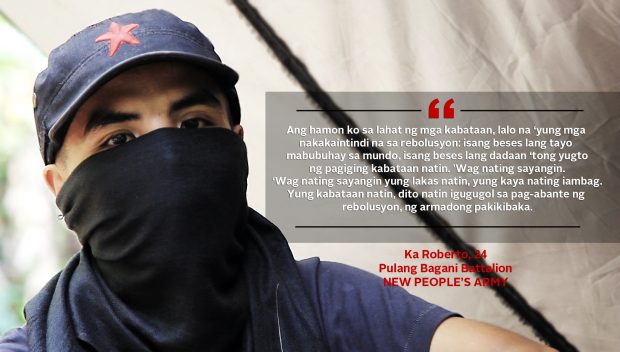by Roy Magsilang for Kodao Productions
CENTRAL NEGROS — If there was any region most affected by the split within the revolutionary movement in the early 1990s, it would have to be Negros.
In 1993, the then Negros Island Regional Committee of the Communist Party of the Philippines declared its “autonomy” and rejection of the Second Great Rectification Movement and, just like that, one of the strongest bastions of the revolution was decimated, losing 80 percent of its strength.
Of the New People’s Army, which was known to mount company-sized operations and could easily muster a battalion on short notice, all that was left was a lone platoon operating within only three villages.
It was to this that former priest Frank Fernandez, who had not too long before left Negros after being given greater responsibilities in the movement, returned, his mission to oversee the recovery – rebirth would probably be a more apt term – of the revolutionary movement on the island.
Fast forward to December 22, 2016, as Juanito Magbanua, commander of the NPA-Negros’ Apolinario Gatmaitan Command, gestures to the thickly forested peaks, above which hawks occasionally soar, that stand like sentries around the village deep in the Central Negros highlands where the rebels are hosting a grassroots peace forum that has gathered easily more than 3,000 people by mid-morning with even more streaming in as the day progresses.
It is the largest event the rebels say they have ever hosted.
“We have a few platoons stationed around us to guard the occasion,” he tells a journalist who has just passed an NPA checkpoint manned by one of the platoons at the road leading to the village.
And in the grounds of the school where the forum was being held, there were easily two or three more platoons, one detailed to render military honors during the singing of the communist anthem “Internationale,” the others involved in preparing and performing in a cultural program, feeding the multitude, entertaining the guests, including children, and the host of other tasks involved in such a huge event.
For all the cynicism with which the so-called millennial generation is often looked at, they were an overwhelming presence among the Negros NPA. Just as they were at the protests that followed the burial of the dictator Ferdinand Marcos at the Libingan ng mga Bayani.
It was, indeed, a far cry from 1993 when the NPA platoon that remained after the split celebrated the founding anniversary of the Communist Party of the Philippines, its 25th but the first in Negros in the time of rectification.
Held in a small forest hollow in the dead of night with only some 30 or so of the masa, the songs, speeches and militant chants reduced to whispers because just that afternoon they had gone on high alert after a military patrol was spotted in the vicinity.
Speaking later to journalists at a press conference together with Fernandez, who allowed the media to show his face publicly for the first time in three decades, Magbanua said Negros is currently divided into four guerrilla fronts, each covering the rough equivalent of one congressional district: the Roselyn Pelle Command of the Northern Front, the Leonardo Panaligan Command of the Central Front, the Armando Sumayang Jr. Command of the Southwest Front, and the Rachelle Mae Palang Command of the Southeast Front.
“And we are currently busy developing even more guerrilla fronts,” Magbanua said, laughing off claims of Brigadier General Jon Aying, commander of the Army’s 3rd Infantry Division and former chief of the Negros-based 303rd Infantry Brigade, “that only around 200 NPA fighters remain” on the island.
“Just look around you and judge for yourself if what he claims is true,” Magbanua said.
In fact, he said, given that the NPA is now spread through 120 guerrilla fronts throughout the country, “the government does not have the capacity to defeat, much less, crush us.”
He noted that during the term of former President Benigno Aquino III, “he wanted to deploy one battalion to each NPA front. His problem was, there are only more than 80 infantry battalions.”
And even if it could be managed, the NPA of Negros have proven time and again that a battalion or even two are not enough to defeat a much smaller, but highly mobile and disciplined, guerrilla force.
For example, that lone platoon in 1993 survived the next few years with nary a scratch despite major offensives involving one or more Army battalions before it deployed small teams to undertake recovery and expansion work.
Militarily, Magbanua explained, “the AFP (Armed Forces of the Philippines) can mount full-scale operations in only 10 guerrilla fronts and only for up to six months at most, giving the other 110 fronts the opportunity time to rest, strengthen themselves, and mount their own operations.”
“Really, the future is bright for the revolution,” he said, “which is why the government has been forced to enter into peace talks with us.” #

